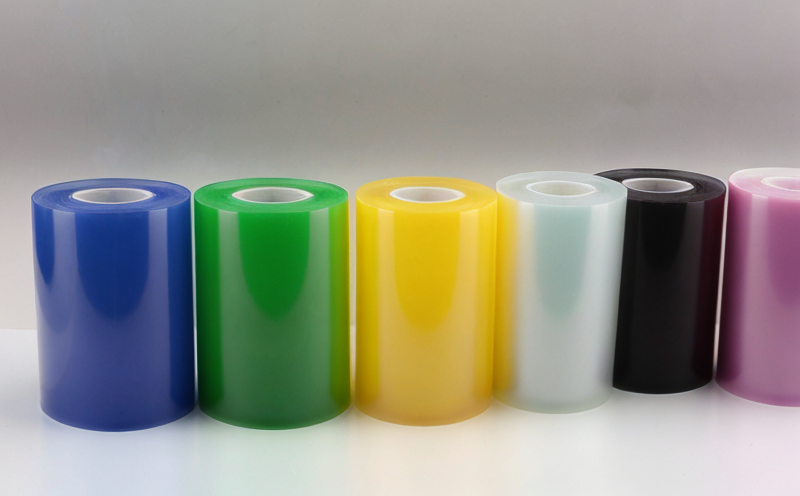JIS K 7218 Hardness Testing of Plastic Films
The Japanese Industrial Standard (JIS) K 7218 hardness testing method is specifically designed to evaluate the hardness properties of plastic films and sheets. This test is crucial for quality managers, compliance officers, R&D engineers, and procurement teams involved in the manufacturing and supply chain sectors.
Hardness testing provides insights into how a material will withstand mechanical stress during use, which is essential for ensuring product durability and safety. The JIS K 7218 test is particularly important for applications where plastic films are used under high stress conditions, such as in packaging materials that need to endure various environmental factors.
The hardness of plastic films can influence their performance in several ways:
- Thermal Stability: Harder films generally have better resistance to thermal degradation, which is critical for products intended for high-temperature environments.
- Tensile Strength: Higher hardness often correlates with increased tensile strength, enhancing the durability of the film under stretching conditions.
- Impact Resistance: Harder films can withstand greater impact forces without cracking or breaking.
The JIS K 7218 method involves using a specific type of indenter to apply a predetermined load to a sample cut from the plastic film. The hardness value is determined by measuring the depth of indentation made in the material. This test ensures that the product meets the required standards for quality and performance.
For accurate results, it is essential to follow strict specimen preparation guidelines. Typically, specimens should be cut from the center of a roll or sheet, allowing for consistent testing conditions. The orientation of the sample must also be considered; the surface to be tested should be free from any defects that could affect the test result.
The hardness tester used in this method is a specifically calibrated machine designed to apply the correct load and measure indentation depth accurately. Compliance with JIS K 7218 ensures that the testing process adheres to international standards, providing reliable data for decision-making processes within manufacturing and quality control departments.
Why It Matters
The hardness of plastic films is a critical factor in determining their suitability for various applications. Understanding the hardness properties helps manufacturers optimize product design, ensuring that materials possess the desired mechanical properties without unnecessary costs or material waste.
For quality managers and compliance officers, JIS K 7218 ensures that products meet international standards and regulatory requirements. This is particularly important in industries such as packaging, where the integrity of the film can impact product safety and shelf life.
R&D engineers benefit from this test by gaining insights into how different formulations or processing techniques affect the hardness of plastic films. This information aids in developing new products that meet market demands while maintaining high-quality standards.
For procurement teams, knowing the hardness properties allows them to select suppliers who can provide materials meeting specified criteria, ensuring consistent quality throughout the supply chain.
Scope and Methodology
| Parameter | Description |
|---|---|
| Type of Indenter | The JIS K 7218 test uses a steel ball with a diameter of 1.59 mm as the indenter. |
| Load Applied | A load ranging from 0 to 3,000 g is applied depending on the expected hardness range of the plastic film. |
| Dwell Time | The indenter remains in contact with the sample for a specified dwell time (typically 15 seconds). |
| Measurement of Indentation Depth | The depth of indentation is measured using an optical microscope or other precision measurement instruments. |
| Sample Preparation | Samples should be cut from the center of rolls or sheets, ensuring a consistent orientation and free from defects. |
| Test Environment | The test is conducted under controlled conditions to ensure accurate results, typically at room temperature (23 ± 2°C). |
The JIS K 7218 standard specifies the exact parameters and conditions necessary for conducting a hardness test on plastic films. Compliance with these guidelines ensures that the test results are reliable and comparable across different laboratories.
For accurate measurement, it is crucial to use calibrated equipment and trained personnel who understand the nuances of the JIS K 7218 method. This ensures consistent testing and repeatable results, which are vital for maintaining quality standards in manufacturing processes.
Eurolab Advantages
At Eurolab, we offer comprehensive JIS K 7218 hardness testing services tailored to meet the needs of our clients. Our team of expert technicians and engineers ensures that every test is conducted with precision and accuracy.
We use state-of-the-art equipment calibrated according to international standards, including the latest versions of the JIS K 7218 guidelines. This guarantees that our results are reliable and can be trusted by quality managers, compliance officers, R&D engineers, and procurement teams worldwide.
Our facilities are equipped with advanced optical microscopes and other precision measurement instruments to ensure accurate determination of indentation depth. Additionally, we provide detailed reports summarizing the test results, including any deviations from standard tolerances.
Eurolab offers swift turnaround times for testing services, allowing clients to receive their results promptly. This is particularly beneficial for those working on tight deadlines or requiring immediate feedback on product quality.
We also offer training sessions and workshops to help our clients understand the JIS K 7218 method better. These sessions are designed to provide in-depth knowledge about specimen preparation, equipment calibration, and data interpretation, ensuring that all stakeholders involved in testing processes have a comprehensive understanding of the procedure.





